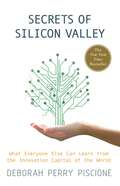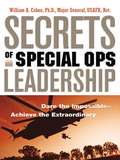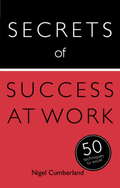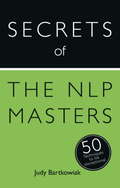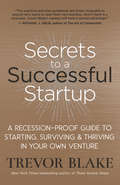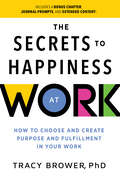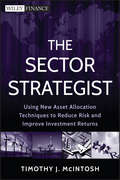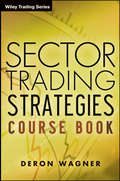- Table View
- List View
Secrets of Silicon Valley: What Everyone Else Can Learn From the Innovation Capital of the World
by Deborah Perry PiscioneWhile the global economy languishes, one place just keeps growing despite failing banks, uncertain markets, and high unemployment: Silicon Valley. In the last two years, more than 100 incubators have popped up there, and the number of angel investors has skyrocketed. Today, 40 percent of all venture capital investments in the United States come from Silicon Valley firms, compared to 10 percent from New York. In Secrets of Silicon Valley, entrepreneur and media commentator Deborah Perry Piscione takes us inside this vibrant ecosystem where meritocracy rules the day. She explores Silicon Valley's exceptionally risk-tolerant culture, and why it thrives despite the many laws that make California one of the worst states in the union for business. Drawing on interviews with investors, entrepreneurs, and community leaders, as well as a host of case studies from Google to Paypal, Piscione argues that Silicon Valley's unique culture is the best hope for the future of American prosperity and the global business community and offers lessons from the Valley to inspire reform in other communities and industries, from Washington, DC to Wall Street.
Secrets of Six-Figure Women: Surprising Strategies to Up Your Earnings and Change Your Life
by Barbara Stanny<p>According to the Department of Labor, the average woman in 1998 was bringing home less than $25,000 a year. For every dollar that a man makes, a woman makes between 50 and 75 cents, and that is hardly news. <p>But what you may not know is that, quietly and steadily, the number of women making six figures or more is rapidly increasing. Currently, over fifteen million women make $100,000 or more, and the number continues to rise at a rate faster then for men. And these women come from every industry - psychologists, dot com founders, consultants, freelance writers, and even part-timers. <p>What makes these particular women able to do so well in the workplace? Fueled by curiosity, Barbara Stanny, author of <i>Price Charming Isn't Coming: How Women Get Smart About Money</i>, set out to research this phenomenon. What she discovered was that, though the high-earning women she interviewed came from different backgrounds and had had greatly different work experiences, they all had certain characteristics in common. <p><i>Secrets of Six Figure Woman: Surprising Strategies of the Successful High Earners</i> will be a ground breaking book for high earners who want to ensure their wealth, enhance their success, and learn from others who are in the same boat. It will also offer inspiration, guidance, and motivation to those who aspire to make more.</p>
Secrets of Special Ops Leadership: Dare the Impossible -- Achieve the Extraordinary
by William A. CohenThe Navy SEALs. The Green Berets. Delta Force. These are just a few examples of what are known as ""special ops"" -- unique fighting forces trained to beat overwhelming odds on every mission. Using principles like speed, purpose, repetition, surprise, and simplicity, elite units such as these have throughout history accomplished extremely challenging tasks against vastly superior forces. When something seemingly impossible must be achieved, special ops forces are the ones called upon for a miracle. Just as special ops are needed for critical tasks in battle, ultra-high achievers are needed for special circumstances in business: situations where time is important, when resources are low or insufficient, where you are challenging conventional wisdom or established competitors, or where crisis is imminent. But can commando techniques really work in business? If you can inspire and lead your employees to work at peak performance, they will accomplish dramatic, almost fantastic feats for you -- just as fighting commandos do in battle situations. Secrets of Special Ops Leadership reveals the essential methods commando leaders employ, using dramatic real-life stories of commando leadership from biblical times all the way up through Iraq and Afghanistan in 2005, and showing how similar techniques are used by present-day business leaders such as Steve Jobs, Mary Kay Ash, Robert Townsend, and others. You'll learn the fourteen core practices of special ops leadership, including how to: * Create the Best If you think you can just call some of your regular employees together and give them a pep talk and an impossible task to do, you're wrong. Business commandos aren't born. They must be created. Your first task as a special ops business leader is to recruit, select, train, and motivate the right people. * Build a Commando Team Using models such as Carlson's Raiders, who fought for the U.S. Marines during World War II, the book explains how to work with different personalities, agendas, priorities, and motivations to create a team that works efficiently and effectively to get the job done. * Dare the Impossible Like the Sayeret Mat'kal, the Israeli Special Ops unit that staged the miraculous raid on Entebbe to free hostages on an Air France plane hijacked by terrorists in 1976, successful business ops must aggressively seek out opportunities and know when to transcend conventional thinking to stage an assault and take action. When they've got the right problems to work on, business commandos can do many times the work of normal employees, accomplish more with less, complete projects against looming deadlines, and create innovative new products and strategies. Secrets of Special Ops Leadership gives you the ammunition you need to get a business commando unit up and running and achieve the impossible for your organization.
Secrets of Success at Work: Teach Yourself (Secrets Of Ser.)
by Nigel Cumberland- What do highly successful professionals know that the rest of us don't? - Do they have a secret recipe for success? - Is there a special alchemy at work? Secrets of Success at Work reveals the 50 things you need to know to achieve all your professional goals, whatever your ambition. Some will surprise you, and all will inspire you. Put these 50 simple strategies together and you have a recipe for success in the workplace, a proven formula that will unlock the secrets and uncover your potential.
Secrets of Success at Work: 50 Techniques to Excel (Secrets of Success series #6)
by Nigel Cumberland- What do highly successful professionals know that the rest of us don't?- Do they have a secret recipe for success?- Is there a special alchemy at work?Secrets of Success at Work reveals the 50 things you need to know to achieve all your professional goals, whatever your ambition. Some will surprise you, and all will inspire you. Put these 50 simple strategies together and you have a recipe for success in the workplace, a proven formula that will unlock the secrets and uncover your potential.
The Secrets of Successful Financial Planning: Inside Tips from an Expert
by Dan GallagherThere are six interrelated segments to a complete financial plan: Cash & Budget Planning, Insurance & Risk Management, Tax Management, Retirement Planning, Investment Planning, and Estate Planning. What aspects of the financial plan require sophisticated planning by a professional, and what can savvy, well-educated consumers handle themselves? The Secrets of Successful Financial Planning empowers readers to take charge of their financial present and future, regardless of where they are financially, by presenting technical jargon in a way that’s easy to understand. This book touts several unique and rare reader benefits:Written for DIYers and those needing to select or understand advisorsUseful for new savers up to mid-retirees30 dramatic true stores of client triumphs and tragedies—no dull case studiesUnbiased perspective is neither insurance nor investment skewed, and provides industry secretsAccess via author website to customizable spreadsheets and moreHere is sage advice and insider information known to the very few. For example, consumers buy more long-term care insurance then they need because their advisors are forbidden to show them alternative or supplemental strategies. They buy one large life policy when best-practice analysis usually would find need for two smaller, distinctive types. They get recommendations for annuity, insurance, and investment replacement, but how can they be certain the answers they get are unbiased? Author Dan Gallagher provides advice and counsel that will help readers set the stage for financial security for themselves and their families. He shares what you can do yourself and when you need a pro’s help.
Secrets of the Canadian Real Estate Cycle
by Don R. Campbell Kieran Trass Greg Head Christine RuptashCanadian real estate investors often hear about real estate cycles, yet very few people can describe what they are and how to actually use them to one's advantage. The Canadian Investor's Guide to Secrets of the Real Estate Cycle will show Canadian investors the ins and outs of the various phases of the real estate cycle, such as boom, slump and recovery, in order to equip them with the knowledge to make practical and informed decisions about their portfolios. Written by Canada's top-selling real estate investor and author Don Campbell and Kieran Trass, a leading expert on real estate cycles, the book will drill down into the various causes that affect real estate trends, such as local and global economics, population migration, employment levels, affordability of rental housing, real estate listings and other factors, to provide a scientific basis for assessing current trends and where those trends are heading. Complete with charts, checklists, and real-life stories, The Canadian Investor's Guide to Secrets of the Real Estate Cycle will be an indispensable guide for all investors.
The Secrets of the FBI: The Secret History Of The Fbi
by Ronald KesslerThe Secrets of the FBI by New York Times bestselling author Ronald Kessler reveals the FBI's most closely guarded secrets and the secrets of celebrities, politicians, and movie stars uncovered by agents during their investigations. Based on inside access, the book presents revelations about the raid on Osama bin Laden's compound, the recent Russian spy swap, Marilyn Monroe's death, Vince Foster's suicide, and J. Edgar Hoover's sexual orientation. For the first time, it tells how the FBI caught spy Robert Hanssen in its midst and how the FBI breaks into homes, offices, and embassies to plant bugging devices without getting caught.From Watergate to Waco, from congressional scandals to the killing of bin Laden, The Secrets of the FBI presents headline-making disclosures about the most important figures and events of our time.From the Hardcover edition.
Secrets of the Millionaire Mind
by T. Harv EkerSecrets of the Millionaire Mind reveals the missing link between wanting success and achieving it! Have you ever wondered why some people seem to get rich easily, while others are destined for a life of financial struggle? Is the difference found in their education, intelligence, skills, timing, work habits, contacts, luck, or their choice of jobs, businesses, or investments? The shocking answer is: None of the above! In his groundbreaking Secrets of the Millionaire Mind, T. Harv Eker states: "Give me five minutes, and I can predict your financial future for the rest of your life!" Eker does this by identifying your "money and success blueprint." We all have a personal money blueprint ingrained in our subconscious minds, and it is this blueprint, more than anything, that will determine our financial lives. You can know everything about marketing, sales, negotiations, stocks, real estate, and the world of finance, but if your money blueprint is not set for a high level of success, you will never have a lot of money-and if somehow you do, you will most likely lose it! The good news is that now you can actually reset your money blueprint to create natural and automatic success. Secrets of the Millionaire Mind is two books in one. Part I explains how your money blueprint works. Through Eker's rare combination of street smarts, humor, and heart, you will learn how your childhood influences have shaped your financial destiny. You will also learn how to identify your own money blueprint and "revise" it to not only create success but, more important, to keep and continually grow it. In Part II you will be introduced to seventeen "Wealth Files," which describe exactly how rich people think and act differently than most poor and middle-class people. Each Wealth File includes action steps for you to practice in the real world in order to dramatically increase your income and accumulate wealth. If you are not doing as well financially as you would like, you will have to change your money blueprint. Unfortunately your current money blueprint will tend to stay with you for the rest of your life, unless you identify and revise it, and that's exactly what you will do with the help of this extraordinary book. According to T. Harv Eker, it's simple. If you think like rich people think and do what rich people do, chances are you'll get rich too!
Secrets of the Millionaire Mind: Mastering the Inner Game of Wealth
by T. Harv EkerThis book helps individuals change their way of thinking about money by exploring their financial blueprint. Author asserts that more than contacts, luck, or education, one's success is based on this blueprint. Fortunately, after one identifies his/her blueprint, one can work to change it through implementing Eker's strategies.
Secrets of the Millionaire Mind
by T. Harv EkerSecrets of the Millionaire Mind reveals the missing link between wanting success and achieving it!Have you ever wondered why some people seem to get rich easily, while others are destined for a life of financial struggle? Is the difference found in their education, intelligence, skills, timing, work habits, contacts, luck, or their choice of jobs, businesses, or investments?The shocking answer is: None of the above!In his groundbreaking Secrets of the Millionaire Mind, T. Harv Eker states: "Give me five minutes, and I can predict your financial future for the rest of your life!" Eker does this by identifying your "money and success blueprint." We all have a personal money blueprint ingrained in our subconscious minds, and it is this blueprint, more than anything, that will determine our financial lives. You can know everything about marketing, sales, negotiations, stocks, real estate, and the world of finance, but if your money blueprint is not set for a high level of success, you will never have a lot of money--and if somehow you do, you will most likely lose it! The good news is that now you can actually reset your money blueprint to create natural and automatic success.Secrets of the Millionaire Mind is two books in one. Part I explains how your money blueprint works. Through Eker's rare combination of street smarts, humor, and heart, you will learn how your childhood influences have shaped your financial destiny. You will also learn how to identify your own money blueprint and "revise" it to not only create success but, more important, to keep and continually grow it.In Part II you will be introduced to seventeen "Wealth Files," which describe exactly how rich people think and act differently than most poor and middle-class people. Each Wealth File includes action steps for you to practice in the real world in order to dramatically increase your income and accumulate wealth.If you are not doing as well financially as you would like, you will have to change your money blueprint. Unfortunately your current money blueprint will tend to stay with you for the rest of your life, unless you identify and revise it, and that's exactly what you will do with the help of this extraordinary book. According to T. Harv Eker, it's simple. If you think like rich people think and do what rich people do, chances are you'll get rich too!
Secrets of the Millionaire Mind
by T. Harv EkerSecrets of the Millionaire Mind reveals the missing link between wanting success and achieving it!Have you ever wondered why some people seem to get rich easily, while others are destined for a life of financial struggle? Is the difference found in their education, intelligence, skills, timing, work habits, contacts, luck, or their choice of jobs, businesses, or investments?The shocking answer is: None of the above!In his groundbreaking Secrets of the Millionaire Mind, T. Harv Eker states: "Give me five minutes, and I can predict your financial future for the rest of your life!" Eker does this by identifying your "money and success blueprint." We all have a personal money blueprint ingrained in our subconscious minds, and it is this blueprint, more than anything, that will determine our financial lives. You can know everything about marketing, sales, negotiations, stocks, real estate, and the world of finance, but if your money blueprint is not set for a high level of success, you will never have a lot of money--and if somehow you do, you will most likely lose it! The good news is that now you can actually reset your money blueprint to create natural and automatic success.Secrets of the Millionaire Mind is two books in one. Part I explains how your money blueprint works. Through Eker's rare combination of street smarts, humor, and heart, you will learn how your childhood influences have shaped your financial destiny. You will also learn how to identify your own money blueprint and "revise" it to not only create success but, more important, to keep and continually grow it.In Part II you will be introduced to seventeen "Wealth Files," which describe exactly how rich people think and act differently than most poor and middle-class people. Each Wealth File includes action steps for you to practice in the real world in order to dramatically increase your income and accumulate wealth.If you are not doing as well financially as you would like, you will have to change your money blueprint. Unfortunately your current money blueprint will tend to stay with you for the rest of your life, unless you identify and revise it, and that's exactly what you will do with the help of this extraordinary book. According to T. Harv Eker, it's simple. If you think like rich people think and do what rich people do, chances are you'll get rich too!
Secrets of the Moneylab
by Kay-Yut Chen Marina KrakovskyTaking the findings of behavioral economics from the cocktail party to the boardroom. Experimental economist Kay-Yut Chen leads an economics lab at Hewlett- Packard-the first of its kind at any company. His groundbreaking research into human behavior has turned into tangible results for HP. He has saved the company millions of dollars, simply by explaining why people really do the things they do. MoneyLab offers practical lessons being put to use right now at HP and other leading companies. It explains, for instance, how to: ? Use incentives to influence employees, suppliers, and buyers ? Determine whom to trust, and how much ? Reduce the negative effects of irrational behavior by noticing patterns that don't seem logical ? Take advantage of the human tendency to game the system In the spirit of Predictably Irrational, but with a more practical approach, Chen shows how to translate the findings of behavioral economics into concrete actions to achieve new levels of success.
Secrets of the NLP Masters: 50 Techniques to be Exceptional (Secrets of Success series #15)
by Judy BartkowiakWhat do the NLP Masters know that the rest of us don't?Do they have a secret recipe for success?Is there a special alchemy at work?'The Secrets of the NLP Masters' reveals the 50 things you need to know to excel in the workplace and out of it, just as if you were an NLP expert. Some will surprise you, and all will inspire you. Put these 50 simple strategies together and you have a recipe for success, a proven formula that will unlock the secrets and uncover your potential.
Secrets of the Temple
by William Greiderchronicle of the unseen political struggles that led to financial crisis. It is the inside story of how the Federal Reserve, remote and mysterious to most Americans, actually ran things in the 1980s
Secrets of the Temple: Demystifying the Fed
by Ethan S. HarrisAlthough the Fed was historically an institution cloaked in secrecy, today, there are no secrets when it comes to day-to-day operations. This chapter looks at how the Fed manages the economy, exploring the complicated decision structure, how changes in the interest rates the Fed controls work their way into the economy, how uncertainty affects policy choices, and how the Fed deals with supply shocks.
Secrets of Wealthy People: 50 Techniques to Get Rich
by David StevensonWhat do wealthy people know that the rest of us don't? Do they have a secret recipe for success? Is there a special alchemy to make it work? The Secrets of Wealthy People reveals the 50 things you need to know to build your wealth, capital and investments. Some will surprise you, and all will inspire you. Put these 50 simple strategies together and you have a great recipe for a better life, a formula that will unlock the secrets and uncover your potential.
The Secrets of Word-of-Mouth Marketing: How to Trigger Exponential Sales Through Runaway Word of Mouth
by George Silverman"In our hype-infested society, honest and positive word of mouth can multiply sales explosively. But for those who think it happens by chance (as most marketers do), this book will be an eye-opener. The surprising truth is that word of mouth can be implemented as strategically as any other form of marketing--and at significantly lower cost! This is especially good news for any seller of products or services who must maximize every marketing dollar. Central to this book is the innovative Decision Matrix, which helps readers identify who their potential buyers are and what messages those prospects need to hear from friends, coworkers, and trusted advisors. This matrix is followed by step-by-step guidance on how to construct an integrated ""no vested interest"" campaign that leverages all channels (including traditional media, the Internet, and PR), penetrates successive tiers of audiences, and builds sales exponentially. Marketers will learn how to: * Target the predominate adopter type (innovator, early, middle, late, laggard) * Create the content--the actual words--needed to accelerate the process * Identify the sources and delivery mechanisms that will be most persuasive * Use the wide variety of methods that trigger runaway word of mouth. "
Secrets to a Successful Startup: A Recession-Proof Guide to Starting, Surviving & Thriving in Your Own Venture
by Trevor BlakeEverything You Need to Start and Succeed in Your Own Venture Trevor Blake built three successful startups and sold them for more than $300 million. Now he&’s written a complete instruction manual that covers everything the budding entrepreneur or existing business owner needs to know to build the career or business of their dreams. Unlike the many theoretical guides out there, this is a practical handbook based on Blake&’s wildly successful in-the-trenches experience. It incorporates leading-edge strategies that cover every aspect of running a business — including funding, developing systems, and marketing. Blake presents in-depth insight into managing effectively, maintaining cash flow, and adapting to the changing needs of customers in volatile economic times. One of his most innovative contributions is an emphasis on cultivating the right mindset, and he tells you exactly how to do that. &“The secret to success isn&’t in the plan,&” he writes. &“It&’s in the person holding it.&” His proven methods will give you the confidence to take the entrepreneurial leap and turn your winning idea into an efficient, profitable company.
The Secrets to Construction Business Success
by Thomas C. Schleifer Mounir El AsmarWith a daunting industry-wide business failure rate, construction professionals need to manage risk and finances as effectively as they manage projects and people. The Secrets to Construction Business Success empowers contractors and other professionals to defy the long odds threatening their stability, growth, and very survival. Drawing on the authors’ more than eight decades of combined experience turning around failing firms, this book provides a masterclass in structuring, managing, and futureproofing a construction business. Chapters on measuring and responding to dips in revenue equip executives to recognize and respond to the warning signs of financial distress while chapters on succession planning ensure that organizations survive their founders’ departures. Sample documents and tools developed for the authors’ consulting practice offer field-tested solutions to organizational structure, forecasting, and accounting challenges. A steady source of guidance in an industry with few constants, The Secrets to Construction Business Success makes an invaluable addition to any industry leader’s library.
Secrets to Free Advertising on the Internet: A Complete Comprehensive Guide For Large and Small Businesses on How to Take Advantage of All the Advertising Media Available on the Internet
by Robert Noll Anne BrashierWritten for: Accountants, Doctors, Lawyers, Realtors, Insurance Brokers, Artists, all MLM Reps, Retail Stores...Any type of small to medium-size business interested in FREE ways to advertise on the internet. Email Marketing - Spam or a viable means of advertising? Classifieds - Quick ways to list your company or business for FREE. Search - Google, Yahoo, Bing and More...Easy Placement and all for FREE. Blogs - Should you or shouldn’t you??An effective way to advertise for FREE? MySpace - Set your company on auto-pilot for more sales, and it’s FREE! Facebook - Put a FREE face on your business and gain hundreds of new customers. Pay-Per-Click - Okay, it’s not FREE, but can be quick and cost-effective! Secrets to Free Advertising on the Internet will help your business grow, whether you are already net-savvy or new to the World Wide Web. Marketing expert Robert Noll gives you helpful hints and clear, easy tips on how to use the wide variety of FREE advertising media available online. Reaching out to a whole new customer base can seem intimidating, but Secrets to Free Advertising on the Internet helps you focus your strategy so you don't feel overwhelmed. No matter what your company does, a strong online advertising campaign can help you do it better.
The Secrets to Happiness at Work: How to Choose and Create Purpose and Fulfillment in Your Work (Ignite Reads)
by Tracy BrowerA compelling and practical guide, tailored to help you achieve balance, fulfillment, and joy in your professional life.The Secrets to Happiness at Work book brings together proven strategies from positive psychology, mindfulness, and personal growth to transform your work experience. Dr. Tracy Brower, PhD, MM, MCRw is a sociologist and an award-winning speaker and has over 25 years of experience working with global clients to achieve business results. Her work has been featured in TEDx, The Wall Street Journal, Inc. Magazine, and Fortune.com.Within the pages of this transformative guide, you will discover:Key principles of positive psychology to help you improve job satisfactionPractical mindfulness techniques to reduce stress and improve focusPersonal growth strategies to unlock your potential and improve performanceTips on achieving work-life balance to enhance overall well-beingInsights on fostering a positive work culture and nurturing professional relationshipsThis guide is not just for those feeling dissatisfied in their current position, but for anyone seeking to boost their happiness at work. From managers aiming to improve workplace morale, to individuals seeking personal growth and satisfaction, The Secrets to Happiness at Work is an invaluable tool for creating a more positive and productive professional life.An ideal read for career coaches, HR professionals, corporate trainers, or anyone looking to improve their work life.
Secrets to Winning Government Contracts: How any small business owner can become a profitable Prime Federal Contractor in 12 months or less
by Martin SaenzHOW TO BECOME A PROFITABLE PRIME FEDERAL CONTRACTOR. Martin Saenz and his wife Ruth started their exhibit display design and fabrication business in their basement and, over the course of 14 years and scores of successfully-completed prime federal contracts, have built it into a multi-million dollar enterprise operating out of its own large warehouse and production facility. In this book Martin shares all the fundamental success factors he has learned.
The Sector Strategist
by Timothy J. McintoshUsing Asset Allocation to Reduce Risk and Boost Investing ReturnsPresenting a revolutionary new investment philosophy that redefines how we view sector investing, The Sector Strategist challenges long held ideas about how this unique area of finance operates. Misconceptions, such as the belief that international stocks provide diversification, are preventing investors from making the most of the opportunities for financial growth that sectors provide, and the book presents practical, applicable evidence that a better, more profitable option is available. Additionally, the book hopes to give readers an opportunity to improve returns and protect retirement assets by providing a wide range of techniques and tools designed to optimize wealth that the author has developed over the last decade. Designed to help investors avoid the often inaccurate assumptions made by "experts" which promote typical asset allocationWritten by Timothy McIntosh, investment expert and founder of SIPCO/Strategic Investment Partners, whose firm's stock portfolio has earned five-star returns from Morningstar annually since 2003Contains easy-to-apply tools for wealth protection and growth that have been proven successful during the market fluctuations of 2002 and 2008The history and opportunities afforded by sectors have been written about at length, but no book has broken with tradition so radically, and with such success, as The Sector Strategist.
Sector Trading Strategies
by Deron WagnerIntroducing Deron Wagner′s Sector Trading Strategies a brilliantly simple way to target profits in every market. Wagner walks you through his strategies for charting the market sectors, helping you determine if your stock, option, or other financial product is positioned for huge profit or actually at risk for a loss. Wagner focuses first on the skills necessary for sector trading identifying the realm of tradeable sectors, picking the best indicators, and analyzing risk then lays out his top three strategic methodologies for effective sector trading. To maximize the power of this guide, you′ll also receive access to an interactive online review tool at Traders′ Library′s Education Corner. Inside, learn the nuts and bolts of successful sector trading: The basics of reciprocal relationships and how to profit from them; How to follow mutual fund and other institutional money flow to find the next big trade; How and when to rotate your investment capital and optimize your returns; How to identify strong and weak sectors to place trades that have the best possible upside; Various methods for entering and exiting positions to gain and protect profits; How to increase your daily number of trading opportunities to exploit any market condition; How ETFs and options can be leveraged to get the most from the least; How to analyze risk to increase your trading peace of mind. To obtain the trading power of the big institutions, you need Wagner′s Sector Trading Strategies. With his help, you will be able to generate consistent profits no matter what the markets throw your way.
